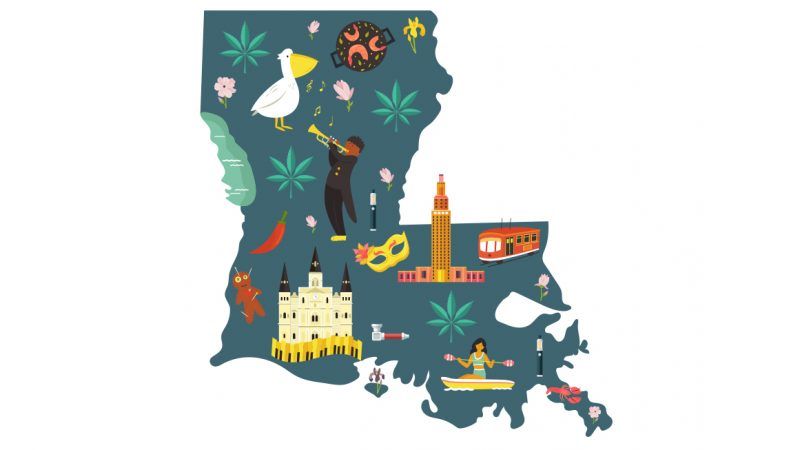The Cajun Cannabis Conundrum
In Louisiana, the legal medical marijuana scheme is a mess: Physicians' hands are tied by state regulators and there's not enough pot to go around for the patients who need it.

Despite being a historically conservative state, Louisiana first legalized medical marijuana back in 1978. It amended the law in 1991, then left the program to wither on the regulatory vine, with the Department of Health failing to appoint a Marijuana Prescription Review Board or to draw up contracts with national groups for production and distribution.
That began to change in 2015, when Republican state Sen. Fred Mills, a pharmacist and the former executive director of the Louisiana Board of Pharmacy, sponsored legislation to implement the distribution of medical cannabis to patients. In 2016, Mills sponsored a second law that laid out the program's specifics. Both bills eventually passed the state House and Senate and were signed into law by former Republican Gov. Bobby Jindal. In early August, Louisiana officially became the Deep South's first state to dispense medical marijuana.
In theory, the program is working: Roughly 1,500 patients in Louisiana are receiving medical cannabis. But some 5,000 patients have consulted with physicians about the program, and there doesn't appear to be enough legal marijuana to go around. Advocates say that's because a series of compromises among lawmakers, the Louisiana District Attorneys Association, the Louisiana Sheriffs' Association, and conservative Christian groups have made a regulatory disaster of the law.
Mills says he originally intended for the legislation to be "more of a free market system." It's not. Under state law, only nine pharmacies in nine zones across 52,000 square miles received permits to dispense medical marijuana. Smokeable and edible versions of the product were banned, as was vaporization. (Oils, tinctures, sprays, pills, and gelatin-based chewables are allowed.) The Louisiana Department of Agriculture and Forestry has licensed just two growers—GB Sciences and Ilera Holistic Healthcare—to contract with the agricultural departments at Louisiana State University and Southern University, respectively, to produce medical cannabis for the entire state. As of this writing, only LSU's operation is producing medical marijuana; Southern University's first crop isn't expected until later this year.
Despite advocates' pleas, only certain doctors are allowed to recommend medical cannabis to patients, and the state created a list of qualifying conditions rather than allowing physicians to use their discretion.
"I've always testified that this should be a decision 100 percent between a physician and a patient, and if somebody has a debilitating condition, then why should government get in the way?" Mills says. But he was forced to change his approach. "The only way I could get the legislation passed was to work cooperatively with the law enforcement community. I think if we hadn't done what we needed to, to basically take an approach of crawl before you walk and walk before you run, I don't think we would have passed the legislation."
Kevin Caldwell, the president and founder of the cannabis reform group Commonsense NOLA, says the current system is "unsustainable," an outcome his group warned of early in the legislative process. "But nonetheless that is how things were decided," because the Louisiana District Attorneys Association and the Louisiana Sheriffs' Association "are the kings of the Louisiana Legislature."
Patients and advocates were excluded from the regulatory process, Caldwell says, and it shows in the state-run market. A 30-milliliter jar of THC tincture costs between $180 and $220 at certain medical marijuana dispensaries—three times the price found in states where recreational adult-use cannabis is legal. What's more, he adds, "a lot of the sickest patients that want to use the program are on Medicaid and don't quite have the money for a $200 visit and then the follow-up visit." Restricting how many physicians can recommend cannabis has likely made the cost of obtaining a recommendation more expensive.
Republican state Agricultural Commissioner Mike Strain, whose department regulates the production of medical marijuana, doesn't see a problem. "If you have the type of diseases that it's designed to treat under the law and you can go to a physician, and there are a significant number of physicians there, and one of the nine pharmacies that distribute it across the street, there should not be a problem to access."
Mills hopes increased social acceptability will eventually push the program forward. He points to how former Democratic Gov. Kathleen Blanco's family recently went public about her using medical marijuana on her deathbed earlier this year. "Her family really attributes medical marijuana to her quality of life," Mills says. "I just think that [the medical marijuana program] is going to be more accepted and I think the unknowns will become more familiar for those who have been fighting us."


Show Comments (10)